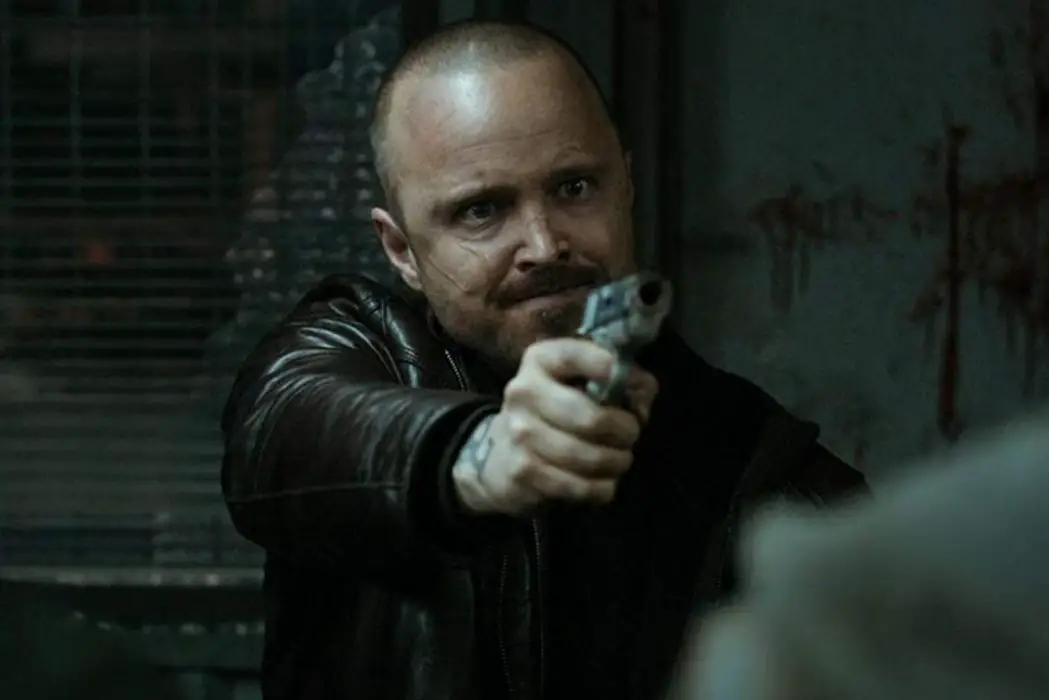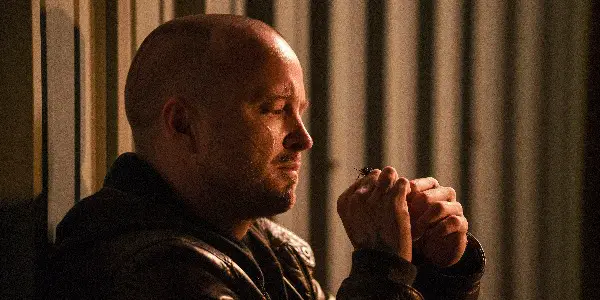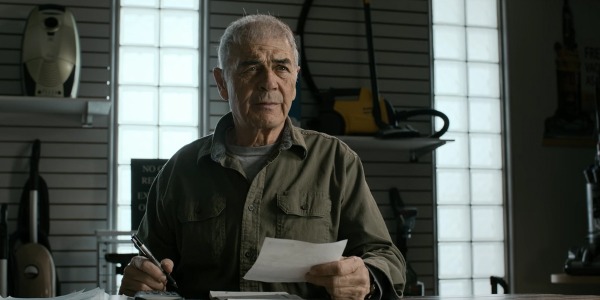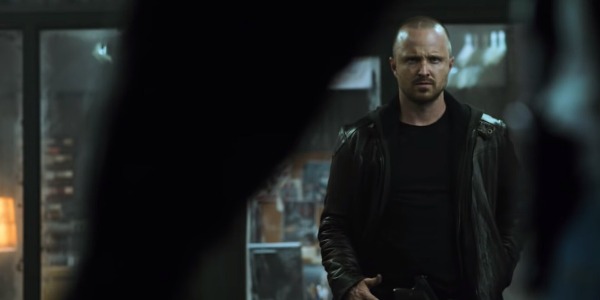EL CAMINO: A BREAKING BAD MOVIE: An Ordinary But Affectionate Farewell

I'm a film journalist and independent filmmaker who fell in…
Even before the series ended, individual episodes of Breaking Bad were declared televisual classics, and masterpieces of direction and storytelling. Especially in light of Better Call Saul surpassing expectations (even getting Guillermo Del Toro to praise it more than its predecessor), El Camino: A Breaking Bad Movie feels rather slight, and in many ways, does not feel as significant any of the episodes of the series that spawned it. However, it is not without its own bucket of gems.
Following the heels of the series finale (Felina), Jesse Pinkman (Aaron Paul) escapes the massacre that took place at Jack Welker’s (Michael Bowen) compound, thanks to his now-deceased ex-partner, Walter White (Bryan Cranston). A fugitive from the law, Jesse decides that there is no going back to his old life without being imprisoned, and decides to get the services of the “disappearer’ Ed Galbraith (Robert Forster), in the hopes of having a new life. Because Jesse flaked out on Galbraith in order to confront Walter about his manipulative personality and near-death of a child, Galbraith doubles the already expensive price, leaving Jesse with no other options.
The Writing
Some audiences took issue with the fact that come the end of Felina, Walter White resolved everything a little too nicely, down to the fact that he would not be tried for his crimes nor would he have to endure more cancer. The issue with El Camino is that it doesn’t strike us as an ambitious endeavour, and pretty much goes from A to B without many complications. And let’s be honest, complications made up the fabric of Breaking Bad.

The overarching idea in the series was that despite us making our own choices and utilising as much of our own free will, we will forever be at the mercy of an uncaring deity or universe, and that fate will always have other plans. Only towards the end of this film however, do we get a rather blatant explanation of how you should follow your own individuality and not let the universe make choices for you. In many ways, it spells out what was beautifully implied throughout the series, with random impulses and personal choices defining action, and, unfortunately, feels rather shoehorned into what ultimately feels like a fairly ordinary story.
Even if El Camino doesn’t have Vince Gilligan’s magic touch, the film does shine whenever Jesse recalls previous events before his “rescue”. The flashbacks featuring his interactions with three (now-deceased) characters, over three different periods in the series, are mostly effective, poignant and make the damndest bit of difference to a fairly straightforward narrative. With each of them signifying a pivotal relationship in his life, we may come to the assumption that Gilligan may be reminding us of the genuine affection and care they may have had for Jesse, and how, despite their often harsh demeanour or circumstance-influenced motivations, they truly want what’s best for him.
A significant flashback stems from Jesse’s time imprisoned by the Jack Welker gang, where his beef with the murderous sociopath Todd Alquist (Jesse Plemons) intensified after Todd convinced his uncle Jack to spare Jesse his life in order to cook meth for them. Even if it didn’t end well for Todd, his cold-blooded personality and deceptive nature made his true feelings for Jesse quite ambiguous, and these flashbacks further illustrate the sense of manipulation Todd would incorporate into Jesse’s enslavement, thereby destroying his spirit.

While the Jesse’s primary antagonist comes in the form of Neil (Scott MacArthur), who, like Jesse, is also after Todd’s money, the film doesn’t treat him as anything more than an obligatory villain, which is unfortunate considering how significant he turns out to be to Jesse’s plight. While Jesse suffers a form of PTSD, it feels rather uneven and quite rushed, making his journey a little too easy. It’s at this point where El Camino may have enjoyed more riches were it fleshed out as a mini-series in order to effectively charter Jesse’s return to his old self.
The Acting
As expected from Gilligan, he loves his characters enough to give his his actors the freedom, space and time to discover the various nuances and heartbeats that would define their roles. Jesse always struck us as the most emphatic character who gradually developed a strong moral compass, and Aaron Paul retains Jesse’s aggressive & sarcastic demeanour that we all know and love, while effortlessly balancing it out with a sense of defeat and vulnerability. Through Paul’s eyes and other silent forms of expression, we come to realise Jesse’s maturity and his deep desire to come clean with what he’s helped destroy.
Both the new and returning cast members live up to the great quality we’ve been accustomed to in Gilligan’s productions, particularly Jesse Plemons, who enhances the enigmatic persona that Todd possessed from the moment he was introduced to us.
Most exciting of all, is to see the late Robert Forster, who passed away on the day El Camino premiered. Based on his interaction with Walter White and Saul Goodman, we knew Ed to be calm, cool and collected, and practically someone we could trust our life with (for the right price). Forster brought his long, varied career into this character, giving him a very natural, brutally honest demeanour, and did his best to try and hide any trace of humanity, in order to maintain his professional etiquette. In what would turn out to be rather bittersweet, his last scene in El Camino might just be the most fitting goodbye the actor could ever give us.
Style
Owing a lot of its style to the influence of film noir and spaghetti westerns, El Camino maintains the dark world beautifully established in the series, and gleefully mixes low-lit scenery with bright yet gloomy exteriors. The series would often make use of establishing new areas by focusing on normally mundane details (like water dripping out of a faucet, buckets of fry batter leaking out or various religious figures sprawled on a cupboard), and while El Camino doesn’t do that as much, it makes a point of emphasising the “lived-in” and often gritty nature of various rooms and locations.
A great example would be Todd’s apartment. Not only does it look like a fresh addition that would have been treasured in the series, but it gives us a hint of the deeply disturbed nature of his characters. His keeping various figures in snow-globes in rather perverse scenarios is quite horrifying, but worse yet, is when he keeps the same tarantula from the Drew Sharp Killing, and places figures in the terrarium, almost suggesting that he’d wish they’d be alive to suffer at the mercy of the arachnid.

Even in replacing the gritty handheld approach with more stable & static camerawork, we get a sense that Gilligan and his team are creating the cinema they always aimed for with Breaking Bad. There is also no shortage of absurd, dark and wacky humour, that serve as welcome moments of levity to accompany the intense drama (which was another great trait of the series).
Legacy
Arguably, El Camino is more likely considered an epilogue rather than a “finale”, with Jesse’s sense of reflection appearing to acknowledge the eventful series’ timeline. The problem isn’t that the film exists, but rather it feels incomplete despite the fact that it strikes one as ambitious (much like Breaking Bad and Better Call Saul).
No matter how you look at it, Breaking Bad will always be a hard act to follow, and everything was poured into the fourth and fifth seasons. In some ways, it may have paid to just hang on to Jesse’s excited face when he Burst out of the Welker complex on his way to freedom, with an open-ended nature left to our imagination.
While it isn’t a terribly exciting conclusion to a richly-textured saga, it’s the little moments along the way that make El Camino a heartfelt final chapter in a great character’s story.
Watch El Camino: A Breaking Bad Movie
Does content like this matter to you?
Become a Member and support film journalism. Unlock access to all of Film Inquiry`s great articles. Join a community of like-minded readers who are passionate about cinema - get access to our private members Network, give back to independent filmmakers, and more.
I'm a film journalist and independent filmmaker who fell in love with cinema at a young age. I also love writing about comics, literature, podcasts, television and video games. I'm just as content watching a movie about a giant killer pig terrorising the Australian outback as I am with one that features a catholic priest in crisis.













